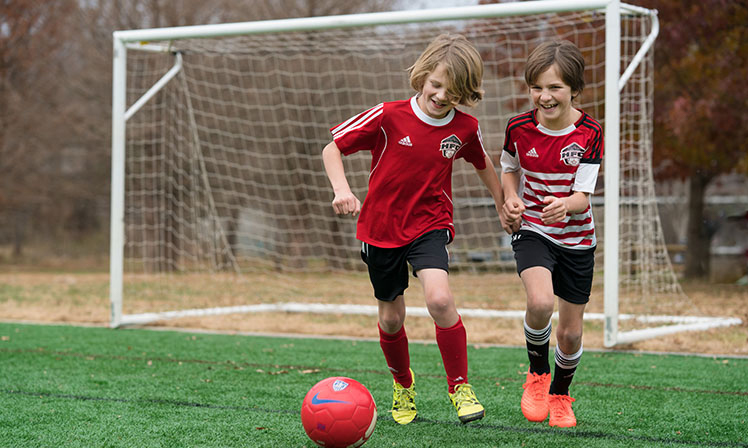
Western North Carolina is known for its natural beauty, its eccentric inhabitants and its boundless opportunities for adventure. Not often is it immediately associated with stiflingly hot weather — but, even in the mountains, summer heat poses a threat to locals and visitors alike.
As the temperature turns up in Asheville, Mercy Urgent Care urges you to keep your cool, whether you’re hard at work in the sunshine or just taking a leisurely stroll. “Adhering to heat-related safety tips and precautions could save you a trip to the doctor,” says Mercy Urgent Care’s Medical Director Dr. Elizabeth McCarty. “It could even save your life.”
What are heat-related illnesses?
Every year in the United States, around 400 deaths are attributed to excessive natural heat. These deaths are all preventable. Heat-related illnesses occur when the body fails to cool itself after being exposed to high temperatures, resulting in illnesses like heat rash, sunburn, heat cramps, heat exhaustion or heat stroke, listed in order from mild to severe.
Think of your body as a hard-working machine. The harder it works, the more heat is produced. It comes equipped with processes to cool itself down, but the system can malfunction when overworked — especially when outside influences like high temperatures, humidity and certain medications are thrown into the mix.
Know the symptoms:
When the body begins to overheat, it sends out signals to let you know. Early symptoms of heat-related illnesses include fatigue, heavy sweating, headache, dizziness, nausea and a high pulse rate. Patients may begin to feel faint or weak, develop muscle cramps and notice clamminess of the skin.
As heat-related illnesses progresses, an individual may begin to experience life-threatening symptoms, such as a high body temperature, confusion, convulsions or fainting. Due to severe dehydration, patients may also have red, hot and dry skin.
Prevention:
It’s especially important to pay attention to your body when exposed to excessive heat. Knowing and watching for the symptoms of heat-related illnesses is part of the prevention process, but there are ways to avoid feeling ill altogether:
1. Stay well-hydrated (with the right beverages). Drink plenty of water, even if you do not feel thirsty — and avoid caffeine, sugary drinks and alcohol. These drinks affect the body’s temperature even without excess heat, speeding up the heart rate, elevating blood pressure and causing the body to dehydrate faster. Staying hydrated helps the body to sweat, and sweat is your natural defense against heat.
2. Wear the right clothing and protect against sunburn. Minimize the skin’s exposure to the sun while also allowing it to breathe. Wear lightweight, loose-fitting clothing, sunglasses, bandannas, wide-brimmed hats and sunscreen with an SPF of at least 15. The key is to find a breathable balance, allowing sweat to easily evaporate, while also protecting the skin from sunburn, which adversely affects the body’s ability to cool itself. Excessive clothing or equipment decreases the body’s tolerance for heat. Sunscreen should be reapplied at least every two hours — more often if swimming or sweating.
3. Pace yourself or change your schedule. Whether you’re working or adventuring, allow yourself frequent breaks in the shade or in air conditioned buildings. Taking breaks allows the body to recover and cool itself between bouts of heat exposure. This is especially important during the hottest parts of the day, when the sun is directly overhead. If at all possible, try to schedule exercise or outdoor work in the early mornings or evenings.
4. Take note of personal factors and medication side effects. Unfortunately, some people are more susceptible to heat illnesses than others, and it’s especially important for those individuals to recognize the increased threat. Small children and adults over 65 have an increased risk, as well as those with chronic conditions — or individuals who are not used to hot weather. Many medications also affect the body’s ability to tolerate high temperatures, stay hydrated and dissipate heat. If you take any medications, be aware of the side effects andkeep a watchful eye on your body. If you do have an increased risk of heat illness, notify others in your group. Run through a list of early symptoms with those around you, and make sure they know what to do in case of emergency.
Treating heat illness:
If you or someone you know is experiencing the early symptoms of a heat-related illness, immediately stop all activity, move to a cooler place to rest and sip water or an electrolyte replenishing sports drink. For individuals experiencing heat exhaustion, loosen any clothing items, place cool, wet cloths on the body or take a cool bath.
If the individual begins to vomit, has a history of heart problems or experiences worsening or prolonged symptoms, seek medical help right away.
For severe symptoms that may indicate heat stroke — such as fainting, high fever, confusion, dry skin and a fast, strong pulse — call 911 right away. Heat stroke is a medical emergency, and can be fatal without medical intervention. While waiting for medical professionals, move the individual to a cooler place, remove excess clothing and help lower the body temperature by whatever means available, concentrating ice packs or cool, wet cloths around the neck, armpits and groin. If the person is not alert or is vomiting, do not give him or her anything to drink.

